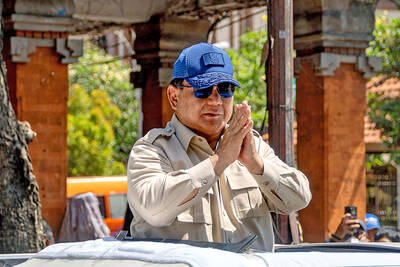China’s highest court overturned 15 percent of all death sentences handed down in the first half of this year, an official newspaper said yesterday, although the total number of executions carried out remains a state secret.
The China Daily touted the rejection rate as a sign of the high degree of scrutiny exercised by the court since it took back the right of final review from lower courts last year.
Most death sentences were overturned for lack of evidence or because they were “inappropriate,” the paper quoted Judge Gao Jinghong, of the Supreme People’s Court’s Third Criminal Law Court, as saying.
China is following international trends in reducing numbers of executions and could eliminate the death penalty altogether “when social conditions demand so,” the paper said. “But for now it has to stay.”
China is believed to execute more people per year than any other country. Human rights group Amnesty International estimates that at least 470 people were put to death last year. That was down from an estimated 1,010 in 2006, the group said, but cautioned that the actual number of executions was undoubtedly higher.
Despite recent reforms, China still keeps execution figures secret, for reasons that remain obscure. Many aspects of China’s legal system remain opaque, with cases considered to have political aspects tried behind closed doors. Evidence, even in capital cases, is described only vaguely and often goes unchallenged.
The Supreme People’s Court relinquished the right of final review to speed up hearings and executions amid an anti-crime drive launched in the 1980s.
The court’s right was restored on Jan. 1 last year following a series of scandals involving miscarriage of justice and false prosecutions that put pressure on the legal system.
The use of the death penalty even for nonviolent crimes such as graft or tax evasion have lent Chinese justice a reputation for brutality that increasingly sensitive communist image managers have been eager to alter.
But prospects for further change are uncertain at best. Zhou Yongkang (周永康), who handles law and order issues on the Chinese Communist Party’s supreme nine-member Politburo Standing Committee, told judges and prosecutors earlier this month that China’s unique political, cultural and economic orientation ruled out the adoption of Western legal standards.

DEADLOCK: Putin has vowed to continue fighting unless Ukraine cedes more land, while talks have been paused with no immediate results expected, the Kremlin said Russia on Friday said that peace talks with Kyiv were on “pause” as Ukrainian President Volodymyr Zelenskiy warned that Russian President Vladimir Putin still wanted to capture the whole of Ukraine. Meanwhile, US President Donald Trump said that he was running out of patience with Putin, and the NATO alliance said it would bolster its eastern front after Russian drones were shot down in Polish airspace this week. The latest blow to faltering diplomacy came as Russia’s army staged major military drills with its key ally Belarus. Despite Trump forcing the warring sides to hold direct talks and hosting Putin in Alaska, there

North Korea has executed people for watching or distributing foreign television shows, including popular South Korean dramas, as part of an intensifying crackdown on personal freedoms, a UN human rights report said on Friday. Surveillance has grown more pervasive since 2014 with the help of new technologies, while punishments have become harsher — including the introduction of the death penalty for offences such as sharing foreign TV dramas, the report said. The curbs make North Korea the most restrictive country in the world, said the 14-page UN report, which was based on interviews with more than 300 witnesses and victims who had

COMFORT WOMEN CLASH: Japan has strongly rejected South Korean court rulings ordering the government to provide reparations to Korean victims of sexual slavery The Japanese government yesterday defended its stance on wartime sexual slavery and described South Korean court rulings ordering Japanese compensation as violations of international law, after UN investigators criticized Tokyo for failing to ensure truth-finding and reparations for the victims. In its own response to UN human rights rapporteurs, South Korea called on Japan to “squarely face up to our painful history” and cited how Tokyo’s refusal to comply with court orders have denied the victims payment. The statements underscored how the two Asian US allies still hold key differences on the issue, even as they pause their on-and-off disputes over historical

CONSOLIDATION: The Indonesian president has used the moment to replace figures from former president Jokowi’s tenure with loyal allies In removing Indonesia’s finance minister and U-turning on protester demands, the leader of Southeast Asia’s biggest economy is scrambling to restore public trust while seizing a chance to install loyalists after deadly riots last month, experts say. Demonstrations that were sparked by low wages, unemployment and anger over lawmakers’ lavish perks grew after footage spread of a paramilitary police vehicle running over a delivery motorcycle driver. The ensuing riots, which rights groups say left at least 10 dead and hundreds detained, were the biggest of Indonesian President Prabowo Subianto’s term, and the ex-general is now calling on the public to restore their